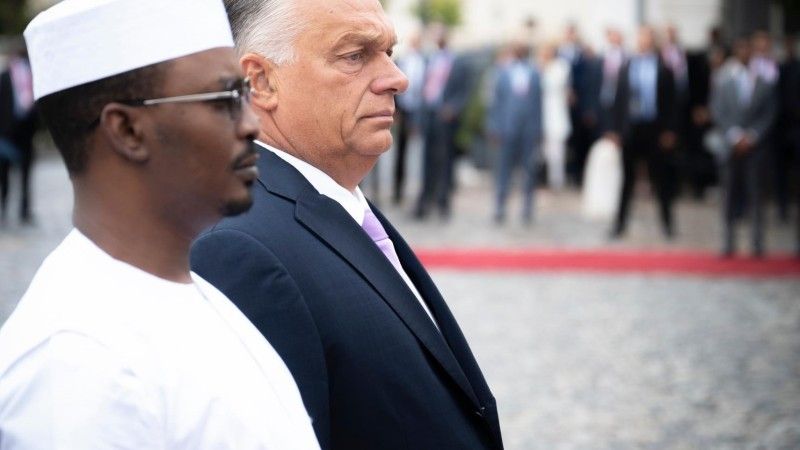Hungary Sends Troops to Africa

Budapest is deploying a military contingent to Chad, consisting of 200 to 400 soldiers. Their tasks will include training national armed forces, fighting terrorism, and curbing illegal migration. The first operators will soon begin operations in the Sahel, currently one of the world’s most unstable regions. France and Russia are competing for influence in this area, giving Hungary a unique opportunity to build its own network and pursue an independent policy in Africa. Prime Minister Orbán has planned this move for years. Now, in Chad, he will need to coordinate actions, considering both France and Russia.
Chad is one of Africa’s poorest countries, with over 50% of the population living in extreme poverty. Out of 16 million Chadians, 5.5 million urgently require humanitarian aid. There is one doctor per 250,000 people, and the country hosts around 200 ethnic groups speaking approximately 100 languages and dialects. With over 2 million refugees, Chad has taken in more migrants than any other African country since the latest outbreak of war in Sudan in 2023. Terrorist groups, including Al-Qaeda, the Islamic State, and Boko Haram, operate within Chad. Chad’s GDP is $13 billion, comparable to the GDP of Poland’s Podlaskie region, which stands at $16 billion.
On November 6, 2023, the Hungarian Parliament approved the deployment of Hungarian Armed Forces to Chad. The military contingent will have a maximum of 200 soldiers (400 during transitional periods) equipped with necessary military gear and tasked with advisory, support, and training roles on the battlefield in Chad and beyond. They will protect Hungarian citizens and interests, support anti-terrorism efforts, and combat illegal migration.
Hungarian soldiers will be stationed in Chad until December 31, 2025. Defense Minister Kristóf Szalay-Bobrovniczky, after signing a military cooperation agreement with his Chadian counterpart, said, „The Hungarian Armed Forces have already taken part in numerous foreign missions, but this is the first time they will undertake such a mission independently in cooperation with Chad’s forces.” This aligns with the government’s stance that security must also be fostered through bilateral relations.
Hungary has embassies in Algeria, Angola, Egypt, Ethiopia, Ghana, Kenya, Libya, Morocco, Nigeria, South Africa, and Tunisia. Additionally, it maintains diplomatic representations in the Democratic Republic of Congo (DRC), Rwanda, Chad, and Uganda, with closed embassies in Guinea, Somalia, and Sudan. Budapest plans to open more embassies, starting with Chad and later Senegal and southern Africa.
A Slice of History
On July 27, 2024, Hungarian Prime Minister Viktor Orbán, in his annual ideological-program speech, emphasized the need to break away from U.S. influence, stop supporting Kyiv, and seek reconciliation with Moscow. His agenda also focused on partnerships with Asian countries, particularly Beijing. Orbán’s speech comprehensively summarized his view of the international situation and outlined Budapest’s foreign policy directions.
Although Africa wasn’t directly mentioned in Orbán’s speech, it remains an important focus of Hungary’s foreign policy. Budapest’s lack of access to the sea hasn’t restricted its interest in the continent. Hungary, under the long-standing rule of Fidesz, hasn’t historically had a developed African policy, but that began to change under Orbán. He sees opportunities in Sub-Saharan Africa and the Sahel to enhance Hungary’s diplomatic influence, improve migration security, elevate Hungary’s international standing, and strengthen economic ties.
Hungary maintains diplomatic relations in the Maghreb, Horn of Africa (Ethiopia and Kenya), and select Sub-Saharan countries (Ghana, Nigeria, Angola, Uganda, South Africa, Rwanda, and DRC). However, Budapest lacks an embassy in the Sahel, the region currently drawing the greatest attention of Hungarian decision-makers, as demonstrated by their recent actions toward Chad.
In a historic first, DRC President Félix Antoine Tshisekedi visited Hungary and met with Viktor Orbán. The Hungarian Prime Minister announced a comprehensive strategic cooperation program with DRC, plans to open an embassy in Kinshasa, continued scholarship programs for African students, and efforts to strengthen ties in cobalt mining and lithium-ion battery production. At the same time, Budapest renewed relations with Rwanda, a regional rival of DRC. Rwanda is finalizing a diplomatic mission in Hungary and participates in the Stipendium Hungaricum scholarship program. Supporting Rwanda’s hydro-policy through water supply modernization is also a key element of their bilateral relations. Hungary’s „equidistant” diplomatic model aims to balance diplomatic and humanitarian efforts to minimize migration to Europe.
Over the past year, Hungary has steadily built relations with Chad, opening a humanitarian aid center and diplomatic representation in the capital and signing agreements on agriculture and education. Another step was the announcement of 200 Hungarian soldiers (with an option to increase to 400) being sent to Chad at the invitation of President Mahamat Déby Itno.
It is my pleasure to welcome President @GmahamatIdi in Hungary. The Republic of #Chad is a key country in the fight against illegal #migration. Migration from Africa to Europe cannot be stopped without the countries of the #Sahel region. That is why #Hungary is building a… pic.twitter.com/GFPDngQBZb
— Orbán Viktor (@PM_ViktorOrban) September 8, 2024
Budapest has introduced a military presence, plans to operationalize an embassy, opened a humanitarian aid center, and signed agreements in agriculture and education. It also plans to involve its own army in training local forces against jihadists. It should be noted that, since the end of NATO’s mission in Afghanistan in 2021, the Hungarian army has lacked an active theater to practice military operations in a relatively high-risk environment. Chad and the Sahel, plagued by continuous conflict, offer an ideal setting.
Strengthening Bilateral Relations
Hungary and Chad have signed a strategic partnership declaration, including four agreements on cooperation. In defense, they signed two agreements: one on defense cooperation and another on the status of Hungarian soldiers stationed in Chad. The documents were signed by Hungarian Foreign and Trade Minister Peter Szijjártó and Chad’s Minister of Foreign Affairs Abdéraman Koulallah. In 2024 alone, several high-level meetings occurred in both N’Djamena and Budapest.
Despite tensions with Budapest, the European Union has „welcomed” Hungary’s initiative in Chad. Any state that actively engages in stabilizing Africa and fighting illegal migration is invaluable. This move by Orbán has considerably strengthened his position.
Criticism and Hidden Agendas
Opposition experts and politicians worry that Budapest, which maintains close ties with the Kremlin, may be acting on Russia’s behalf in the Sahel. When asked about the mission, the Hungarian government denied „representing Russian or any other foreign interests in the Sahel.” Domestic opposition criticizes the operation as a „waste of money” and „dangerous,” with soldiers themselves divided on the mission, which promises to be challenging.
This is not the only accusation directed at Viktor Orbán. He is also accused of nepotism, as his son, Gáspár Orbán, involved in secret negotiations, was ultimately appointed liaison officer for preparations in N’Djamena. Gáspár Orbán previously worked with the Christian aid organization „Empower a Child” in Uganda and is the only person to have participated in at least six meetings related to Hungary’s military mission in Africa from May 2023 to January 2024. His efforts are supported by László Máthé, Hungary’s ministerial commissioner for Sub-Saharan foreign policy coordination, and Foreign Minister Péter Szijjártó.
Hungary’s growing involvement in Africa marks a strategic pivot, with Budapest, led by Fidesz and Viktor Orbán, diversifying partnerships and expressing skepticism toward Western organizations like NATO and the EU. Relations between Hungary and the Sahel should be closely monitored, as the deployment of a 200-strong contingent to Chad will not solve regional challenges related to migration and jihadist threats.
An intriguing case is Orbán’s „family diplomacy,” as he engages his son as a direct delegate in African relations, which has been notably effective in fostering ties with Chadian President Mahamat Déby Itno and former Nigerien President Mohamed Bazoum (until the July 2023 military coup). A challenge in Hungarian-African relations may be Budapest’s actual capacity for humanitarian aid and infrastructure investment.
Hungarian investigative journalist Szabolcs Panyi, editor at VSquare.org and Direkt36.hu, comments: _”No one understands it, and there is grumbling within the Hungarian army about the mission. The whole affair is largely driven by Viktor Orbán’s son, Gáspár Orbán, who previously spent time in Africa and seems to have personal contacts there. Hungary appears to be seeking economic benefits, possibly energy-related, in Chad. The involvement of the Prime Minister’s family has also led to speculations about private interests, corruption, and covert deals with Russia. The government’s official explanation doesn’t make sense, and no one in Hungary believes it.
Initially, Hungary planned to send troops to Mali, but a coup there changed the situation. Then, due to high-level contacts within the local elite, Gáspár Orbán connected with Chad’s ruling family. It seems clear that neither Chad nor Hungarian-Chadian relations drove the decision. Why 400 soldiers? No one knows, but it is evident that it’s not based on military and security concerns.”
Is It a Giga-Chad for Hungary?
In early September 2024, Chadian President Mahamat Idriss Déby visited Budapest and met with Viktor Orbán. As Western countries pull out of the Sahel, where Russia is consolidating its position, Viktor Orbán’s unpredictable Hungary is sending 200 soldiers to Chad, an unprecedented mission for Central and Eastern European countries. According to the Hungarian Prime Minister, Chad is key in combating immigration and terrorism, and as a NATO member, Hungary must intensify its global relations.
Initially, Hungary aimed to join the French-led „Takuba Task Force,” but the EU-led special forces mission ended in failure. Afterward, Hungary searched for alternatives following complete withdrawals from Mali, Burkina Faso, and Niger. Notably, Chad wasn’t Hungary’s first choice, but after the coup in Niamey, alternative partnerships were explored. Hungarian soldiers in Chad will cooperate with the French, who will handle logistics and security.
Poland had a military episode in Chad with the EUFOR operation in N’Djamena, the fifth EU military operation under the Common Security and Defence Policy. The Polish contingent’s main tasks included patrolling, escorting humanitarian convoys, ensuring safety for UN personnel and NGOs, aiding local and displaced people, protecting strategic sites, and civil-military cooperation. Poland withdrew its contingent in December 2009, and currently, Poland is not considering any mission (even training) in Africa.
Taking advantage of international attention, Chadian authorities are signaling a shift toward Russia to pressure their Western allies while prudently diversifying military partnerships (United Arab Emirates, Turkey, Hungary). Though moving away from French influence is an option, Paris still maintains a military base in N’Djamena and remains a critical security partner for Chad.
For Hungary, this will be a „test mission,” marking the beginning of a potential series of future deployments. Some doubts arise regarding which interests Hungary will serve in Chad. Russia is highly active in the Sahel, while the EU (led by France) has withdrawn from the region. Consequently, Budapest has several open communication channels. Sending troops to Chad will not change the Sahel’s situation, which would require at least three hundred similar Hungarian contingents. Nonetheless, Orbán has managed to insert himself into a region where his opinion and assessment of the situation will carry weight.
Authors: dr. Aleksander Olech, Konrad Markiewicz

WIDEO: Defence24 Days 2025: Premier Defence & Security Conference in CEE